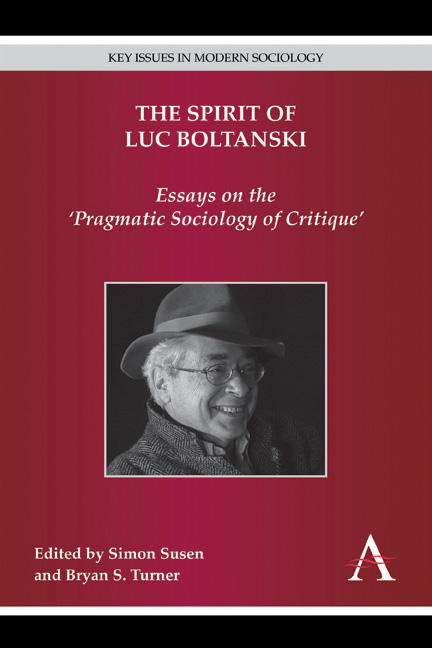Book contents
- Frontmatter
- CONTENTS
- List of Contributors
- Preface
- Part I Introductory Remarks
- Part II Luc Boltanski and (Post-) Classical Sociology
- Part III Luc Boltanski and Pragmatism
- 2 Did You Say ‘Pragmatic’? Luc Boltanski's Sociology from a Pragmatist Perspective
- 3 Why (Not) Pragmatism?
- 4 The Moral Idealism of Ordinary People as a Sociological Challenge: Reflections on the French Reception of Luc Boltanski and Laurent Thévenot's On Justification
- Part IV Luc Boltanski and Critique
- Part V Luc Boltanski and Critical Sociology
- Part VI Luc Boltanski and Political Sociology
- Part VII Luc Boltanski and Contemporary Issues
- Part VIII Luc Boltanski in Conversation
- Part IX Luc Boltanski and His Critics
- Index of Names
- Index of Subjects
4 - The Moral Idealism of Ordinary People as a Sociological Challenge: Reflections on the French Reception of Luc Boltanski and Laurent Thévenot's On Justification
from Part III - Luc Boltanski and Pragmatism
Published online by Cambridge University Press: 05 December 2014
- Frontmatter
- CONTENTS
- List of Contributors
- Preface
- Part I Introductory Remarks
- Part II Luc Boltanski and (Post-) Classical Sociology
- Part III Luc Boltanski and Pragmatism
- 2 Did You Say ‘Pragmatic’? Luc Boltanski's Sociology from a Pragmatist Perspective
- 3 Why (Not) Pragmatism?
- 4 The Moral Idealism of Ordinary People as a Sociological Challenge: Reflections on the French Reception of Luc Boltanski and Laurent Thévenot's On Justification
- Part IV Luc Boltanski and Critique
- Part V Luc Boltanski and Critical Sociology
- Part VI Luc Boltanski and Political Sociology
- Part VII Luc Boltanski and Contemporary Issues
- Part VIII Luc Boltanski in Conversation
- Part IX Luc Boltanski and His Critics
- Index of Names
- Index of Subjects
Summary
In 1987, a theoretical book that had been co-written by the sociologist Luc Boltanski and the economist and statistician Laurent Thévenot appeared in an obscure, poorly distributed collection of the Presses Universitaires de France. At first sight, its title may have sounded rather strange: Les économies de la grandeur (Economies of Worth). What was even more disconcerting, however, was the apparent disproportion between the ordinariness of the main issues in question (that is, disputing processes in the workplace, the family, the neighbourhood, etc.) and the ambitious nature of the theoretical framework. In fact, the authors put forward a whole set of new concepts borrowed from Western philosophical thought, ranging from the writings of St. Augustine to those of Adam Smith. How do we explain this kind of conceptual brainstorming in relation to a minor object such as ordinary processes of justification? Another reason why this book may have surprised some is the fact that one of the two authors, Luc Boltanski, was largely known as a prominent representative of ‘Bourdieusian’ sociology. One need only read the first few paragraphs of the book to be under the impression that this oeuvre can be conceived of as an attack on Bourdieusian thought. Four years later, in 1991, a revised – but almost identical – version of the book was published under the title De la justification (On Justification) by the prestigious ‘NRF Essais’ collection edited by Gallimard. Obviously, it was a crowning moment. In the meantime, its circulation amongst intellectual circles had generated a revolutionary effect, intensified by the spread of the new edition.
The main purpose of the book is reflected in the following idea: we need to take seriously the fact that ordinary actors are equipped with critical, moral, and judgemental capacities. The book suggests that, in the context of classical sociology, such an undertaking had never really occurred. This certainly applies to approaches inspired by Marxism and/or structuralism (e.g. Bourdieu) as well as to ‘realist’ approaches (e.g. rational choice theory, Crozier-Friedberg's ‘strategic analysis’, etc.), since they have a tendency to ascribe normative claims to an underlying general equivalent (for example, ‘domination’, ‘force’, ‘self-interest’, etc.), whose sociological significance is supposed to have a universal explanatory power.
- Type
- Chapter
- Information
- The Spirit of Luc BoltanskiEssays on the 'Pragmatic Sociology of Critique', pp. 153 - 170Publisher: Anthem PressPrint publication year: 2014



